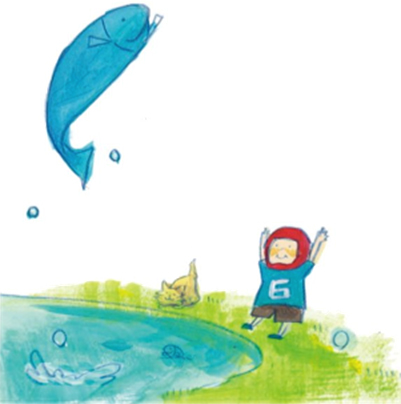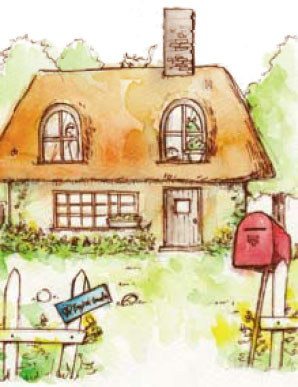



Edition One
Published by
English Garden Books
Azuma 3-8-12
Tsukuba, Japan.
Copyright © 2012 by English Garden Books
ISBN: 9784990540265
All rights reserved. No part of this book may be reproduced in any form or by any means without the prior written permission of the publisher.
Cover Image and illustrations by Kaori Takahashi,
Table of Contents
Fishing for ABCs
ABC Milk Carton Houses
ABC Paper Cups
ABC Board Game
ABC Memory
ABC Blocks
ABC Bean Bag Toss
ABC Puzzle Race
ABC Scavenger Hunt
Uppercase/Lowercase Match
Uppercase/Lowercase Bingo
ABC Concentration
A Word Guessing Game
Ticklish Writing
An Upper/Lowercase Talking Card Game
Team Writing
Throw the Beanbag/Name the Letter
A Beginning Sounds Picture Game
Find that Sound!
Karuta
A Bean Bag Phonics Game
Muddle in the Middle
A Team Phonics Game
What Beginning Phonics Can You Spy?
An Addition Game with Dice
A Baseball Addition Game
Listening for Numbers
Listen Up/Find it First
Numbers and Alphabet
Can You Find the Missing Number?
Who Will Win the Big Money?
Musical Numbers
Rhythmic Listening
Ribbon Fun
Listen, Remember and Find
Flashcard Name Game
Can You Cross the River?
Put Your Hand In and What Will You Find?
Category Bean Bag Toss
Let’s Go to the Cafeteria
Little Shoppers
Colors and Categories
If I Say Banana
Little World Travelers
A Team Drawing Game
Job Cards
A Bowling Interview Game
Flashcard Fun
The Emotions Game
Three Hint Animal Quiz
Introduction
Whether you are new to teaching young learners or are a veteran teacher, it’s always good to have a few new tricks up your sleeve! Over the fifteen years that I have been teaching little ones both in the United States and Japan where I currently live, I’ve found these activities to work extremely well, and I want to share them with you and your young students. I’ve also included some websites that I believe to be particularly helpful in our quest to keep students stimulated and excited to learn. Some of the following activities are original and some are unique ways to introduce those tried and true lessons on which we all rely. Here are fifty ideas which I hope will serve as a springboard – helping you tap into your own vast creative reservoir! For video support for these activities, please visit our website and view our Activity of the Day.

I wish you happy teaching!
All the best to you,
Deborah Grow
http://www.englishgarden.co
Where Young Learners Unlock the World Through English and Music
LEARNING THE ALPHABET
A B C D E F G H
I J K L M N O
P Q R S T U V
W X Y Z
Activity 1
Let’s Go Fishing!
Fishing for ABCs
Children around the world love to pretend to fish. This is a popular children’s game in Japan and in this version, the fish are “ABC” fish.

Preparation
Draw and cut out twenty-six identical fish from construction paper. Mark each one with a letter of the alphabet and attach a paper clip. Although it is tempting to become artistic and make them colorful, it is a good idea to keep them simple by using construction paper of all the same color, and keeping the size of the fish uniform. This keeps the focus on the letter of the alphabet and not on the fish itself.
Next, make a homemade fishing pole. This can be made from tightly rolled paper secured with scotch tape, a little string, and a magnet. My personal version is a drumstick with plastic wire tied to one end with a dangling ring magnet.
Next, take a large piece of paper or poster board and make an ABC chart with one square for each letter of the alphabet.
Note - Although this game takes some preparation, once it is made it can be used for years! They never get tired of it. For sturdiness and longevity, you may want to cover the construction paper fish with clear contact paper or laminate them. This is my recommendation for all the craft pieces you’ll need, insuring that you’ll have them on hand, in good condition, for quite some time.
How to Play
For small classes, have the children take turns going fishing. Each child starts his or her turn by saying, “I’m going fishing!” Please be sure to tell the children not to swing the pole with the magnet around as it could hit another child. Let the child “catch” a fish, name the letter on that fish, and then match the fish to the corresponding letter on the chart. Once all the fish have found their home, sing the ABC song while pointing to each letter on the chart.
For larger classes, make two charts. Divide the children into teams and make two sets of fish. Have the children line up, and put the fish across the room. They then have to run, pick up the pole, go fishing, put the fish on the right place on the chart, put the pole down, and then run back to tag the next person on their team. The first team to finish wins!
How to Level Up
1. Make one set of fish for uppercase letters and another set for lowercase letters. For beginners, make all uppercase fish one color and all lowercase fish a different color. Put all the upper case fish in one pond, and all lower case fish in a separate pond. Have the children take turns matching uppercase and lowercase fish.
2. Turn it into a phonics fishing game. Find the fish that sounds like “buh” and so on.
3. Turn it into a spelling game, for example, go fishing for the word “cat”. Note: the fish should be returned for the spelling game, otherwise the vowels will soon be gone!
4. Instead of ABC fish, go fishing for new vocabulary words or picture cards.
Activity 2
Find the Right House!

ABC Milk Carton Houses
This is a task-based activity in which the children have to be able to identify a letter of the alphabet, and match it with the same alphabet letter in a different location.
Preparation